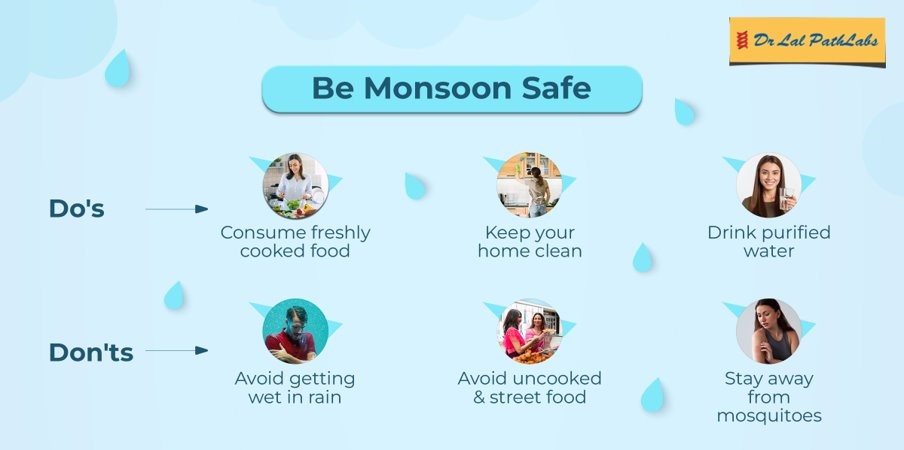Monsoon Diseases – Tips to Stay Safe in Monsoon
Introduction
As the rains bring joy and greenery all around, there are health challenges we must be careful about. The wet and humid environment becomes a perfect place for germs to grow, leading to the quick spread of monsoon diseases.
 Common Monsoon Diseases During Monsoon
Common Monsoon Diseases During Monsoon
- Malaria: Transmitted through the bite of infected female Anopheles mosquitoes, malaria remains a significant concern during the monsoon season. Symptoms include high fever, chills, headache, and body aches.
- Dengue: Caused by the Aedes mosquitoes, dengue is prevalent in monsoon-prone areas. Symptoms range from mild fever to severe conditions like dengue hemorrhagic fever and dengue shock syndrome.
- Chikungunya: Like dengue, chikungunya is transmitted by Aedes mosquitoes. It causes high fever, joint pain, rash, and fatigue.
- Typhoid: Contaminated food and water can lead to typhoid fever, characterized by fever, abdominal pain, headache, and general malaise.
- Gastrointestinal Infections: Waterborne diseases like gastroenteritis and cholera spread rapidly during the monsoon season due to contaminated water and food.
Modes of Transmission
Understanding how monsoon diseases spread is crucial for prevention. The primary modes of transmission include:
- Mosquito Bites: Mosquito-borne diseases like malaria, dengue, and chikungunya spread when infected mosquitoes bite and transmit the pathogens into the bloodstream.
- Contaminated Water: Waterborne diseases like typhoid, gastroenteritis, and cholera spread through consuming water contaminated with fecal matter or bacteria.
- Contaminated Food: Consuming food that is improperly cooked or contaminated can lead to gastrointestinal infections.
- Direct Contact: Certain diseases, like skin infections and conjunctivitis, can spread through direct contact with infected individuals or their belongings.
- Airborne Transmission: Some respiratory illnesses like flu and cold can spread through droplets released when an infected person coughs or sneezes.
Tips to Stay Safe in Monsoon
Now that we are aware of the common monsoon diseases and their modes of transmission, let’s explore some practical tips to stay safe this monsoon season:
- Use Mosquito Repellents: Apply mosquito repellents on exposed skin to protect yourself from mosquito bites. Additionally, use mosquito nets while sleeping to minimize the risk of exposure to mosquitoes.
- Eliminate Stagnant Water: Mosquitoes breed in stagnant water. Regularly check and empty containers like pots, coolers, and discarded tires that can collect rainwater.
- Consume Safe Water: Drink boiled or purified water to prevent waterborne diseases. Avoid consuming raw or cut fruits and vegetables from roadside vendors.
- Maintain Hygiene: Wash your hands frequently with soap and water, especially before eating. Keep your surroundings clean to prevent the breeding of disease-causing organisms.
- Boost Immunity: Eat a balanced diet rich in fruits and vegetables to boost your immune system and stay resilient against infections.
- Avoid Street Food: During the monsoon season, it’s best to avoid street food as it may not be prepared under hygienic conditions.
- Protective Clothing: Wear long-sleeved shirts and pants to minimize exposure to mosquitoes and other insects.
- Stay Informed: Keep yourself informed about any disease outbreaks in your area and follow guidelines issued by health authorities.
Conclusion
Monsoon diseases can pose significant health risks, but with awareness and precautionary measures, we can protect ourselves and our families. By following the tips mentioned above and being cautious about the modes of transmission, we can enjoy the monsoon season while staying safe and healthy. Remember, prevention is always better than cure!













